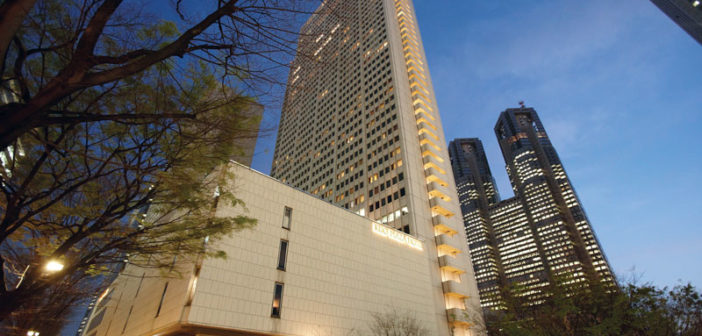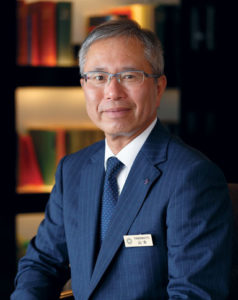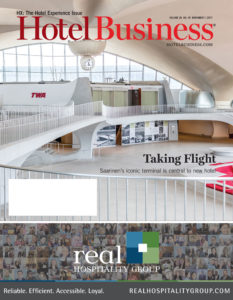NEW YORK—In a town teeming with international leisure and business travelers, Tokyo’s Keio Plaza Hotel has a significant piece of market share, according to Mamoru Yamamoto, the property’s president/representative director. But the executive is out to capture the attention of the U.S. market and was here last month to bring perspective to the brand and its 46-company conglomerate parent, Keio Group, which includes railroads, real estate, hotels and retail in Japan, and where he is a director in Keio Corp.
“We are a domestic brand, but for more than 40 years, we have been welcoming guests from all over the world from more than 100 countries,” said Yamamoto, noting when the property was built in 1971, the Keio Plaza was considered Japan’s first high-rise hotel and the Shinjuku area’s first “skyscraper.”
In addition to the flagship, the brand includes upper-end Keio Plaza Hotel Hachioji, Keio Plaza Hotel Tama and Keio Plaza Hotel Sapporo, along with segmented brands, budget-tier Keio Presso Inn, which runs 150-350 keys, Kario Kamata (apartments), The Share Hotels and a new midscale brand, Keio Prelia, a ground-up model of about 300 keys that is being launched next year in Kyoto, followed in 2019 with an opening in Sapporo.
“The number of foreign tourists to Japan is increasing with more than 3.3 million visits as of June 27, an 18.2% increase over the previous year, according to the JNTO (Japan National Tourism Organization),” said the executive. “Seventy-five percent of staying guests [at Keio hotels]are now from overseas.”
He said Japan also is coming under the tourism spotlight with the Summer Olympics and Paralympic Games set for Tokyo in 2020, noting his company has been “working diligently” to enhance its exposure overseas to take advantage of opportunities to attract international travelers, particularly Americans. The hotel offers a selection of 10 “universal rooms” for guests with disabilities wherein features may be added to the wheelchair-accessible room depending on a guest’s needs.
Indications of the hotel’s offerings were on display during the reception held here at the JW Marriott Essex House. Highlights included the Keio Plaza’s Green Tea Ceremony, sushi and sake tastings, samplings of Arita porcelain used in the property’s decor and a presentation of kimonos that are part of an immersive cultural experience for guests at the hotel.
The property’s 1,438 rooms are spread across two towers that encompass 22 F&B outlets, 38 banquet rooms, three wedding chapels and a plethora of services and departments. While these include the more common offerings of a business center, fitness center, beauty salon, sky pool, food boutique, lounge and spa, the city-center hotel also offers a photo studio, tea ceremony room, karaoke room, medical clinic, day-care center, nursing room, two multi-aspect convenience stores, a retail floor, a tour office and a free shuttle for guests to Tokyo Disneyland.
And, because WiFi connectivity in the city can be sporadic, the hotel also offers smartphones, which may be used by guests to make complimentary calls, including to the U.S.
“It’s like a city. You can find anything inside the hotel,” said Junko Saito, deputy director of marketing.
Over the past decade, Yamamoto noted more than $200 million has been poured into the hotel for renovations and infrastructure upgrades.
For example, last year it opened its Premier Grand Club floors and Club Lounge designed by London-based GA Design International and created to deliver “prestigious comfort” for guests. It also renovated its Sky Lounge, Aurora. Previous to that it renovated its Sky banquet rooms and created Hello Kitty rooms based on the iconic cartoon character.
Speaking further with Hotel Business (through a translator) during the reception, Yamamoto said while the Keio parent group is well known in Japan, it is not as well known here. “We want [people]to know more about us, our brand and Keio Group in the U.S.,” he said, noting the division offers a range of accommodations suitable for executives, families and the budget-conscious.
The parent company owns almost all the sites and hotels. The Karia Kamata and The Share Hotels brands are part of a shared-rental structure, Yamamoto added.
Right now, Americans and Europeans represent some 40% of the Keio Plaza Hotel Tokyo’s business, with a skew toward so-called “bleisure” travelers, said the executive.
Keio Plaza’s main competitors in Shinjuku are Hyatt and Hilton, said Yamamoto. But, as he pointed out, “If you’re coming all the way to Japan, why not stay in a Japanese hotel?”
There are no plans at the moment to expand into the U.S., although it may be part of Keio’s future.
“First I have to expand our group in Japan. After that, we are thinking about making a hotel outside of Japan,” said Yamamoto. HB



